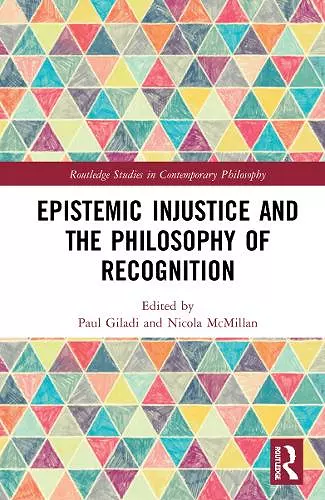Epistemic Injustice and the Philosophy of Recognition
Paul Giladi editor Nicola McMillan editor
Format:Hardback
Publisher:Taylor & Francis Ltd
Published:12th Aug '22
Currently unavailable, and unfortunately no date known when it will be back

This volume includes original essays that examine the underexplored relationship between recognition theory and key developments in critical social epistemology. Its aims are to explore how far certain kinds of epistemic injustice, epistemic oppression, and types of ignorance can be understood as distorted varieties of recognition and to determine whether contemporary work on epistemic injustice and critical social epistemology more generally have significant continuities with theories of recognition in the Frankfurt School tradition. Part I of the book focuses on bringing recognition theory and critical social epistemology into direct conversation. Part II is devoted to analysing a range of case studies that are evocative of contemporary social struggles.
The essays in this volume propose answers to a number of thought-provoking questions at the intersection of these two robust philosophical subfields, such as the following: how well can different types of epistemic injustice be understood as types of recognition abuses? How useful is it to approach different forms of social oppression as recognition injustices and/or as involving epistemic injustice? What limitations do we discover in either or both recognition theory and the ever-expanding literature on epistemic injustice when we put them into conversation with each other? How does the conjunction of these two accounts bear on specific domains, such as questions of silencing?
Epistemic Injustice and the Philosophy of Recognition heralds new directions for future research that will appeal to scholars and students working in critical social epistemology, social and political theory, continental philosophy, and a wide range of critical social theories.
"In this rich collection of new papers, each contribution brings the resources of recognition theory into a fruitful conversation with those of epistemic injustice. Together they deliver a rewarding set of discussions that multiplies our tools for understanding the various phenomena in both theoretical domains. In particular, the idea of misrecognition is especially helpful in focusing attention on the phenomenology of epistemic injustice, bringing a distinctive psychological interpretation to our ways of thinking about its intrinsic wrong. I fully expect this collection to inspire many more such illuminating conceptual collaborations."
Miranda Fricker, Distinguished Professor, The Graduate Center CUNY, USA
“Giladi and McMillan’s volume offers provocative explorations of the relationship between recognition theory and epistemic injustice, enriching and complicating both bodies of literature and opening new venues for research in critical social epistemology. Part I of the book contains powerful elucidations of epistemic and moral forms of recognition, of social esteem and disrespect, of recognition pathologies and ideological misrecognition, and of cultural and institutional forms of epistemic violence. Building on these compelling theoretical discussions, part II of the book develops case studies of contemporary social struggles in which epistemic mistreatment resulting from recognition deficits or distortions take center stage in different areas of public life, including the law, social policy, and medicine. All the chapters in the book contribute to shed light on the complex and multifaceted role of recognition in unjust epistemic practices and dynamics that differentially empower and disempower social groups through prejudicial patterns of knowledge/ignorance, understanding/misunderstanding, and perception/misperception. This superb collection of essays is a must-read for anyone interested in normative issues concerning how oppressed and vulnerable groups are misrecognized and mistreated in public life, and how different forms of misrecognition and epistemic mistreatment can be diagnosed and resisted.”
José Medina, Northwestern University, USA
ISBN: 9781138351714
Dimensions: unknown
Weight: 453g
354 pages